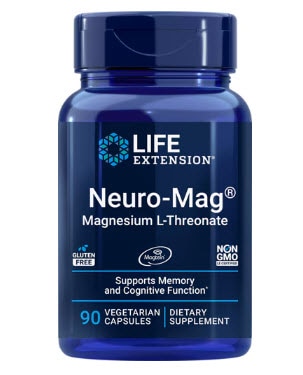Known as the mighty mineral, magnesium plays a pivotal role in more than 600 enzymatic reactions in the body. From heart to brain health, to muscle function and whole-body wellness, your cells need magnesium to thrive. However, it’s not always easy to absorb magnesium from foods alone, and levels naturally decline over time.
So, what exactly does this multifunctional mineral do in the body, and how do you ensure you’re getting enough? Let’s dive in.
Benefits of magnesium
Magnesium is everywhere these days—and for good reason! This buzzworthy mineral is critical in the regulation of your metabolism and in maintaining homeostasis, a state of equilibrium, in all your cells, tissues, organs, systems…you. But how exactly does that work?
Your cells use magnesium to help regulate calcium levels in the body, critical for healthy bone and teeth density. Cardiovascular health also depends on healthy magnesium levels, as the versatile mineral helps maintain a steady heartbeat and supports already-healthy blood pressure levels, contributing to vascular and endothelial function.
What’s more, cells in your central nervous system, the intricate network of nerves that run through your body and spinal cord, needs magnesium to support proper communication between nerve and muscle cells, supporting healthy muscle contractions and overall nervous system function.
In the brain, magnesium has been shown to support the activity of neurotransmitters like GABA, associated with feelings of relaxation and calmness.
Maintaining healthy magnesium levels is crucial to keep your biology healthy. Let’s talk about the sources that provide this magic-like mineral.
Sources of magnesium
As a mineral, your body doesn’t make magnesium, so your primary source should come from magnesium-rich foods. In general, think of eating patterns like the Mediterranean diet that prioritize minimally processed, whole foods.
Not sure where to start? Here are 11 foods that should be added to your menu.
- Fatty fish
- Leafy greens
- Avocados
- Bananas
- Pumpkin seeds
- Nuts
- Dark chocolate
- Legumes
- Potatoes
- Whole grains
- Fortified cereals
Unfortunately, modern diets, such as the Standard American Diet (SAD), consist primarily of highly-palatable, highly-processed foods, which—apart from fortified foods—contain very little, if any, magnesium.
On the other hand, even if you eat bananas and avocados every day, you may still have insufficient levels of magnesium that your body can use effectively. Why? Soil degradation can impact how much magnesium you get from the foods you eat. It’s no surprise that many people turn to dietary supplements to ensure they keep healthy magnesium levels.
Choosing a magnesium supplement
There are three main categories when it comes to magnesium supplements: whole-body health, brain health and stress management. Always speak with your doctor before making any changes to your routine. They’ll be able to guide you in choosing a magnesium supplement based on your health needs.
- Whole-body health: If you’re looking to support cardiovascular function, bone density and overall well-being, you’ll want to go with a magnesium glycinate supplement, a well-absorbed form of magnesium. Magnesium citrate and magnesium oxide are also popular forms of magnesium that confer head-to-toe benefits.
- Brain health: To nourish and support your noggin, look to magnesium L-threonate. It’s a great choice to promote overall brain health and brain-cell-to-brain-cell communication. This form of magnesium has also been shown to support short-term memory and quick thinking. Some brain-supporting magnesium supplements also come in powder form.
- Stress management: Magnesium acetyl-taurate is a form of magnesium that’s been shown to support healthy magnesium levels in the brain, promoting a relaxed state of mind and encouraging feelings of calmness.
In a nutshell, magnesium is required for countless biological processes—a high-quality supplement can help you bridge any nutritional gaps and target specific health goals.
5 tips for staying healthy
Your health depends on the little things you do daily. Building sustainable habits that promote your well-being is the secret to thriving at every age.
In addition to eating magnesium-rich foods, here are five non-negotiable habits to incorporate into your wellness routine.
- Prioritize sleep: Poor sleep can negatively impact your magnesium levels, not to mention your overall health. Practicing good sleep hygiene helps ensure you get restful sleep, a fundamental aspect in maintaining and improving your physical and mental health, not to mention healthy magnesium levels! Adding an supplement can help you get the sleep your body deserves.
- Move daily: Regular exercise is a no-brainer when it comes to maintaining overall health, but you must go beyond cardio and Zumba classes. Diversify your workout routine by integrating weightlifting, functional fitness and mobility exercises to maintain muscles, joint health, bone density and beyond. Make time for full-body movement 30 to 50 minutes a day, four to six times a week.
- Manage stress: The demands of hectic schedules can keep you in a constant state of mild tension that can negatively impact your overall health, including magnesium levels. Simple strategies, such as breathing exercises, cuddling your pooch, calling a loved one, doing arts and crafts, or meditating, not only support your health but also help you become more resilient and less “reactive” to everyday life.
- Maintain social connections: Okay, this one seems farfetched, but strong social bonds have been shown to support mental health, improve mood, and promote a robust immune response—all essential for a long and fulfilling life. Enjoy meals with friends and family, join a volunteer group, or tag along on a road trip to foster healthy relationships and good health.
- Keep up with your blood work: Getting blood work is never fun, but it’s a crucial piece of your wellness puzzle. Lab tests provide you (and your doctor) with a screenshot of the inner workings of your biology, highlighting any area of your health that may be a cause for concern. In other words, regular blood work lets you keep track of important biomarkers such as cholesterol and triglycerides status, thyroid and liver function, nutritional uptake, including magnesium levels.
Featured Products



The post What Does Magnesium Do for the Body? A Medical Doctor Explains first appeared on The Upside by Vitacost.com.


